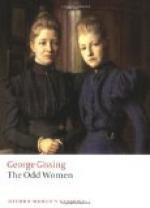To-day for the first time there flashed across him the thought that already he might have been deceived. It originated in a peculiarity of Monica’s behaviour at luncheon. She ate scarcely anything; she seemed hurried, frequently glancing at the clock; and she lost herself in reverie. Discovering that his eye was upon her, she betrayed uneasiness, and began to talk without considering what she meant to say. All this might mean nothing more than her barely-concealed regret at being obliged to leave London; but Widdowson remarked it with a vivacity of feeling perhaps due to the excitement in which he had lived for the past week. Perhaps the activity, the resolution to which he had urged himself, caused a sharpening of his perceptions. And the very thought, never out of his mind, that only a few days had to elapse before he carried off his wife from the scene of peril, tended to make him more vividly conscious of that peril. Certain it was that a moment’s clairvoyance assailed his peace, and left behind it all manner of ugly conjectures. Woman—so said the books—are adepts at dissimulation. Was it conceivable that Monica had taken advantage of the liberty he had of late allowed her? If a woman could not endure a direct, searching gaze, must it not imply some enormous wickedness?—seeing that nature has armed them for this very trial.
In her setting forth for the railway station hurry was again evident, and disinclination to exchange parting words. If the eagerness were simple and honest, would she not have accepted his suggestion and have gone in the morning?
For five minutes after her departure he stood in the hall, staring before him. A new jealousy, a horrible constriction of the heart, had begun to torture him. He went and walked about in the library, but could not dispel his suffering. Vain to keep repeating that Monica was incapable of baseness. Of that he was persuaded, but none the less a hideous image returned upon his mental vision—a horror—a pollution of thought.




